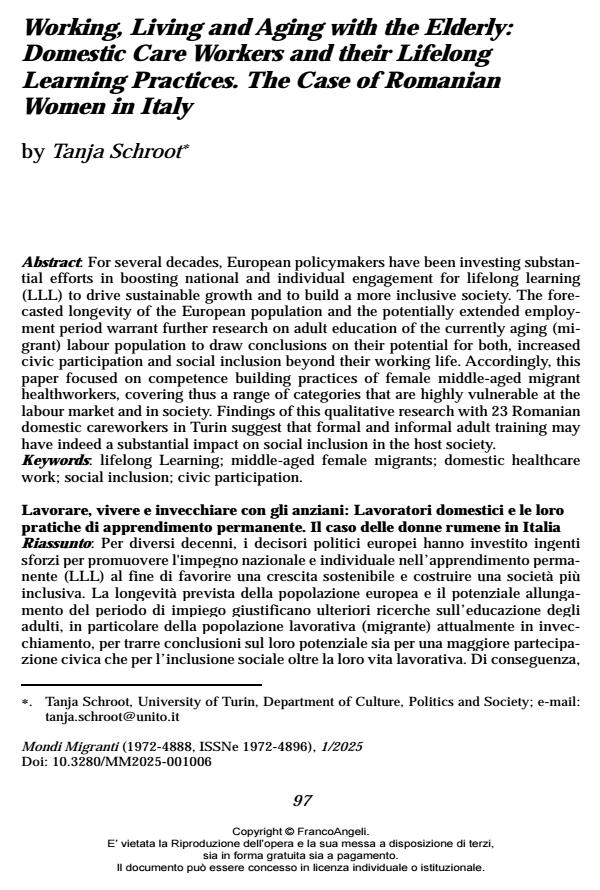Working, Living and Aging with the Elderly: Domestic Care Workers and their Lifelong Learning Practices. The Case of Romanian Women in Italy
Titolo Rivista MONDI MIGRANTI
Autori/Curatori Tanja Schroot
Anno di pubblicazione 2025 Fascicolo 2025/1
Lingua Inglese Numero pagine 17 P. 97-113 Dimensione file 105 KB
DOI 10.3280/MM2025-001006
Il DOI è il codice a barre della proprietà intellettuale: per saperne di più
clicca qui
Qui sotto puoi vedere in anteprima la prima pagina di questo articolo.
Se questo articolo ti interessa, lo puoi acquistare (e scaricare in formato pdf) seguendo le facili indicazioni per acquistare il download credit. Acquista Download Credits per scaricare questo Articolo in formato PDF

FrancoAngeli è membro della Publishers International Linking Association, Inc (PILA)associazione indipendente e non profit per facilitare (attraverso i servizi tecnologici implementati da CrossRef.org) l’accesso degli studiosi ai contenuti digitali nelle pubblicazioni professionali e scientifiche
For several decades, European policymakers have been investing substantial efforts in boosting national and individual engagement for lifelong learning (LLL) to drive sustainable growth and to build a more inclusive society. The forecasted longevity of the European population and the potentially extended employment period warrant further research on adult education of the currently aging (migrant) labour population to draw conclusions on their potential for both, increased civic participation and social inclusion beyond their working life. Accordingly, this paper focused on competence building practices of female middle-aged migrant healthworkers, covering thus a range of categories that are highly vulnerable at the labour market and in society. Findings of this qualitative research with 23 Romanian domestic careworkers in Turin suggest that formal and informal adult training may have indeed a substantial impact on social inclusion in the host society.
Per diversi decenni, i decisori politici europei hanno investito ingenti sforzi per promuovere l'impegno nazionale e individuale nell’apprendimento permanente (LLL) al fine di favorire una crescita sostenibile e costruire una società più inclusiva. La longevità prevista della popolazione europea e il potenziale allungamento del periodo di impiego giustificano ulteriori ricerche sull’educazione degli adulti, in particolare della popolazione lavorativa (migrante) attualmente in invecchiamento, per trarre conclusioni sul loro potenziale sia per una maggiore partecipazione civica che per l’inclusione sociale oltre la loro vita lavorativa. Di conseguenza, questo articolo si è concentrato sulle pratiche di sviluppo delle competenze delle lavoratrici migranti di mezza età nel settore sanitario, coprendo così una serie di categorie particolarmente vulnerabili sia nel mercato del lavoro che nella società. I risultati di questa ricerca qualitativa con 23 assistenti domiciliari rumene a Torino suggeriscono che la formazione adulta formale e informale possa effettivamente avere un impatto significativo sull’inclusione sociale nella società ospitante.
Parole chiave:apprendimento permanente; migranti di mezza età; lavoro sanitario domestico; inclusione sociale; partecipazione civica.
- Educational needs and barriers in dementia care training for migrant family care assistants in Italy: a qualitative study Sara Santini, Antonella Golino, Daniela Grignoli, Flavia Galassi, Georgia Casanova, Serena Cancellieri, Ilaria Chirico, Sara Trolese, Veronica Moretti, Riccardo Pronzato, Rabih Chattat, in BMC Nursing 1357/2025
DOI: 10.1186/s12912-025-03993-y - Tied Movers in Tight Families: Strategies for Migration, Transnational Relationship Building, and the Role of Children as Critical Social Actors. A Case from Romania Tanja Schroot, Georgiana Udrea, in Journal of International Migration and Integration /2025
DOI: 10.1007/s12134-025-01323-4
Tanja Schroot, Working, Living and Aging with the Elderly: Domestic Care Workers and their Lifelong Learning Practices. The Case of Romanian Women in Italy in "MONDI MIGRANTI" 1/2025, pp 97-113, DOI: 10.3280/MM2025-001006